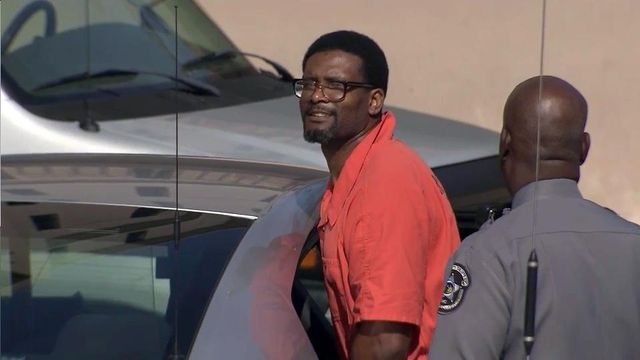Michael Jordan's father's killer challenging SBI testimony
More than two decades after Michael Jordan's father was gunned down in his car in Robeson County and his body dumped in a South Carolina swamp, appeals in the case grind on.
Posted — UpdatedDaniel Green, one of two men convicted in James Jordan's murder, was back in court in Lumberton Friday, arguing that he should be granted a new trial because a state blood analyst provided misleading testimony during his 1996 trial.
Defense attorney Scott Holmes said Jennifer Elwell, an analyst at the state crime lab, testified that blood was found on the seat of James Jordan's car and called four follow-up tests "inconclusive." Those four tests were actually negative for blood, Holmes said, adding that Elwell's testimony influenced the jury.
"She testified, in her opinion, the substance in the car was blood," he said. "She would not have that opinion today, and she would not give the opinion."
At the time of Green's trial, the crime lab was part of the State Bureau of Investigation, and an independent audit of the lab in 2010 found that analysts omitted, overstated or falsely reported information about blood evidence in 190 cases from 1987 to 2003 that ended in convictions.
Green's case was among those listed in the audit, although his name was subsequently removed from the file. Holmes said the authors, two former FBI assistant directors, were "lobbied" to remove Green's name – it was the only one removed after the audit was released.
The audit included dozens of other cases on which Elwell worked. Holmes asked for a copy of an internal interview he believes SBI officials conducted with Elwell conducted during the audit.
Robeson County District Attorney Johnson Britt said Elwell was cross-examined extensively during the 1996 trial on blood testing.
Holmes noted that the blood evidence was destroyed while Green's case was on appeal, which is unusual, and authorities haven't been able to explain how or why that happened.
Green also maintains his trial lawyers were ineffective and that prosecutors never notified his defense team of a plea deal they struck with co-defendant Larry Demery, who was convicted of a lesser crime in exchange for his testimony implicating Green in James Jordan's murder.
James Jordan was shot to death in his car along U.S. Highway 74 near Lumberton on July 23, 1993. His body was found a couple of weeks later in a South Carolina swamp.
Green has repeatedly insisted that he didn't kill James Jordan, and members of his family, some of whom haven't seen him in years, said after the hearing that they still believe he will be cleared of the crime.
"It definitely gave me hope. It really did," said his sister, Ebony Moore. "He’s got people that have always been in his corner. We all love him, and we all support him. He promises me every time he talks to me that he’ll be home, and I do believe him."
Britt said prosecutors would turn the entire case file over to Holmes, adding that he doesn't believe anyone violated Green's right to a fair trial.
"He not only received a fair trial, he received all of the information that he was entitled to," he said, adding that many of the issues raised by Holmes "will be resolved" once he reviews the case file.
Superior Court Judge Robert Floyd set hearing on Green's motion for relief for Feb. 2, 2015, giving defense attorneys and prosecutors months to lay out and respond to the various issues in the case.
• Credits
Copyright 2024 by Capitol Broadcasting Company. All rights reserved. This material may not be published, broadcast, rewritten or redistributed.






